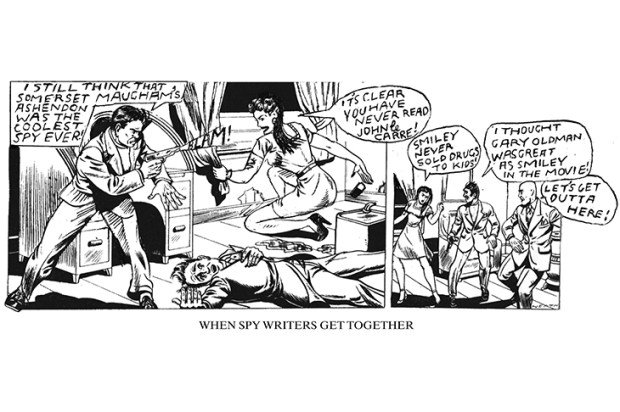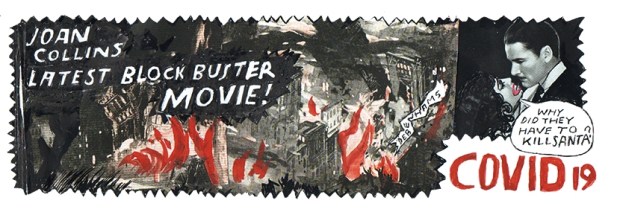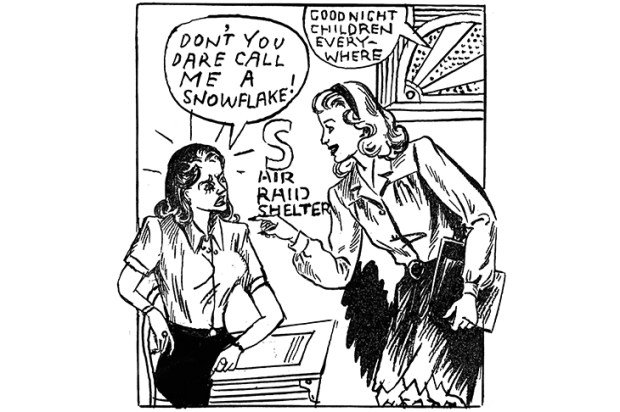Just back from a few days in Rome — the perfect small metropolis for ‘street-haunting’, as Cyril Connolly described his love of strolling through cities. I first went to Rome in 1976, aiming to interview — for my university magazine — three of the writers who lived there or thereabouts at the time. I duly wrote to Anthony Burgess, Gore Vidal and Muriel Spark. All of them politely turned me down but I went anyway and have revisited the city many times. In fact, in the way life sometimes arranges these things, I later met all three writers and even came to know Burgess and Vidal a bit. As reading matter for this short trip I took a new edition of Burgess’s great but little-known novel about the city, Beard’s Roman Women, one of the small sub-genre of novels that have photographs in them. It seems that nothing much has changed in Rome since Burgess wrote the novel in 1975 — except I didn’t see a single Roman street cat. Felinocide?
My contribution to the 100th anniversary of the 1918 Armistice was to take my uncle Eric Boyd out to lunch. A fit 95-year-old, he’s the only surviving veteran of the second world war I know. He was in the navy and is the last of seven Boyd brothers, five of whom served in the war as airmen, soldiers and sailors and all of whom survived. I wanted to pick my uncle Eric’s brain about my late uncle Ronnie (Eric’s younger brother). He was a teenage ordinary seaman on HMS Ajax from 1944-45 and I had heard he had been in Athens with the Ajax in December 1944 when British forces helped put down, with considerable weight of arms, a perceived partisan/communist uprising — the so-called Battle of Athens, or the Dekemvriana in Greece. Not Winston Churchill’s finest hour, it has to be said. Churchill was there on the bridge of the Ajax watching the initial mayhem detonate ashore. During the month-long conflict Ronnie had been ordered, so family legend had it, to turn a machine-gun on an advancing mob. Eric simply said that he thought his brother had been very badly affected by his experiences on the Ajax. He was only 18. PTSD avant la lettre, I suppose.
Talking about war, the Cold War this time, I’ve just finished writing a long-form TV series about British and American spies in Berlin in 1961, set in the summer months before the Berlin Wall went up one Sunday morning in August. Seeing a project through from conception to execution can be a long process — almost four years, in this case. We are meant to start filming next year, fingers crossed. Along the way I have collected inanities uttered by the younger production executives. My best one so far is: ‘You mean there were two Germanys?’ A friend of mine who wrote a film about British internees in Malaya was told to remove the name Singapore from the script because it was a ‘stupid’ name for a city. I remember in one meeting talking to a young script editor about Franco’s Spain and I could see him growing steadily more baffled. Eventually he said to me: ‘Ah, could you remind me about this Franco guy?’ I think he thought ‘Franco’ was a character in the story.
In the course of writing a novel with late 19th-century classical music as its context I interviewed a lot of professional musicians. One of them was a young woman conductor who also played the viola. So, both poacher and gamekeeper. I’ve always been curious about conductors and how they have risen to become the great ‘maestros’. Just as there are bad painters and good painters, bad novelists and good novelists, there must be bad conductors and good conductors, I suggested. Indeed there are, she said, emphatically. Speaking as a member of the orchestra, a viola player, how long does it take her to know that the conductor is bad? ‘About five seconds,’ she said. So what does the orchestra then do, I wondered. ‘We just follow the first violin,’ she said. ‘It works perfectly well.’
I am heading off to rural south-west France for Christmas. This is the 25th Christmas running that I’ll have spent in France. One of the attractions is that Christmas is a one-day holiday there. Everyone is back at work on Boxing Day. You have a large meal with your family and that’s it. I have no regrets about missing the weeks-long commercial bacchanalia that we experience here in Britain. In our local village in France a few tinsel-draped pine branches are propped against walls — the only sign that a global fête nationale is taking place. Church bells ring for midnight mass. Then it’s over and the pine branches are swiftly removed. Normal life resumes.
Got something to add? Join the discussion and comment below.
Get 10 issues for just $10
Subscribe to The Spectator Australia today for the next 10 magazine issues, plus full online access, for just $10.
You might disagree with half of it, but you’ll enjoy reading all of it. Try your first month for free, then just $2 a week for the remainder of your first year.














Comments
Don't miss out
Join the conversation with other Spectator Australia readers. Subscribe to leave a comment.
SUBSCRIBEAlready a subscriber? Log in